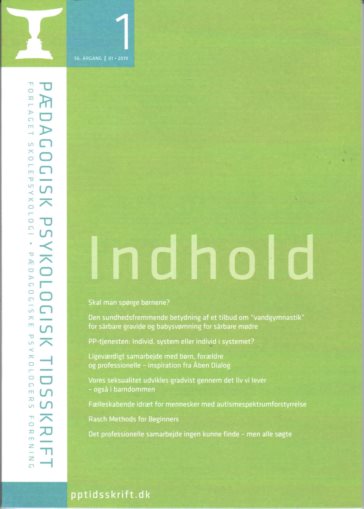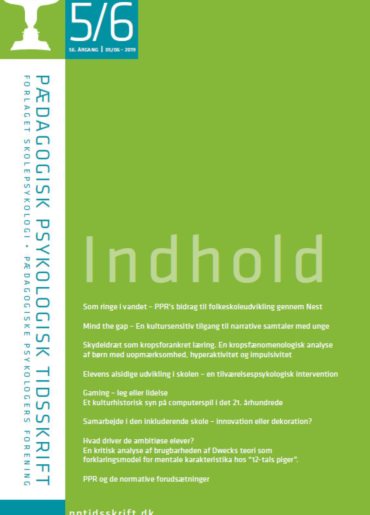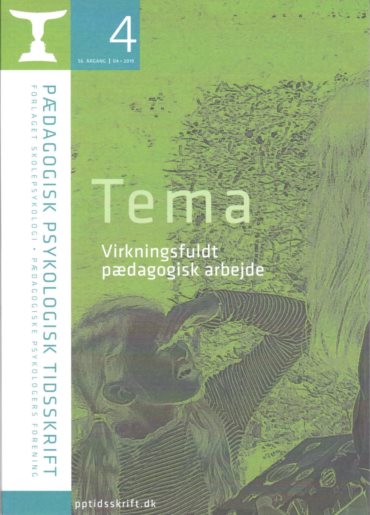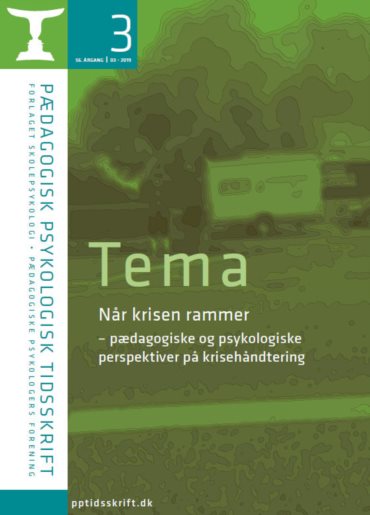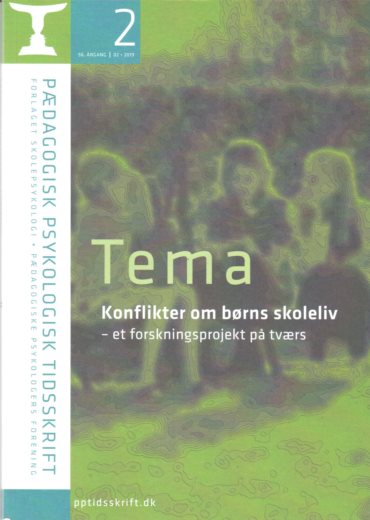Beskrivelse
Abstracts ppt 1/2019
Mette C. Jensen and Tine B. Fisker: Why don’t we ask the kids?
In this article, we will describe a development project and the evaluation of it . The project stretched over a year at a public school in Aalborg Municipality, Denmark . The project was inspired by an increasing political and pedagogical interest in in- corporating children’s perspectives and voices in dealing with difficulties in school life . The project was an effort to implement the Collaborative and Proactive Solu- tions (CPS) model developed by American psychologist Ross Greene . The model ad- vocates taking account of the children’s own perspectives on their challenges . This involves adopting a particular mindset concerning children facing difficulties for- mulated as ‘Kids do well if they can’ . The mindset operationalises in a concept from Greene’s model called Plan B conversations . The conversations are collaborative conversations between an adult and a child, modelling skills such as empathy, changing perspectives and mutual problem solving .
The introduction of the mindset was combined with supervised training in mas- tering the Plan B conversations with individual children, smaller groups and on a classroom level .
The evaluation of the project consisted of qualitative interviews with the ten adults who participated in the project, and with eight of the participating children . The evaluation specifically aimed to reveal the importance and meaningfulness of the conversations for both the children and the adults .
This article will present a description of both the project and the evaluation, re- flecting on the most crucial findings .
Lise Hostrup Sønnichsen: How joining a specially arranged baby swim- ming group can promote the edification of coping and health
This article highlights how joining a specially arranged baby swimming group can promote the edification of coping and health action competence in relation to the role of mother within a group of vulnerable new mothers . The article communicates a small but unique study based on qualitative interviews with participants, profes- sionals and volunteers in a municipal project in Denmark . The study builds on a broad, positive and holistic approach to health with a particular focus on action competence, relation and self-efficacy . The result of the study shows that baby swimming offers both a unique framework to create quality in the relationship be- tween mother and child, and a meaningful framework and exercise of competence to deal with the practical challenges of being a new mother . Moreover, water activity offers positive experiences of one’s own body in motion with the child . The study also shows that a persistent focus on the welfare and development of the child, com- bined with extensive relational competencies among the volunteers and profession- als in the project, has been essential for the mothers’ engagement and positive ex- periences . The positive experiences have been the driving force in achieving an in- creased knowledge, insight and motivation, which indicates that the new mothers achieved increased competence to work with both their own and their child’s health in the future .
Johanne Strønen: Educational and psychological counselling service: Individual, system or individual in the system?
The Educational Psychological Service (EPS) has a dual mandate to focus both on individual needs and at the same time have a system-oriented approach . There is clearly a political expectation and desire for the Educational Psychological Service to focus more on system-oriented approaches . Giving this last part of the mandate greater attention leads to the expectation that fewer children will need special edu- cation .
The purpose of this article is to examine how the increase of EPS system-level work affects support and attention to the individual child at school .
The article is based on a case from an Educational Psychological Service office in Norway, where an extensive variety of system-oriented work was directed at a school class over a period of several months . Despite this work, only months after, a child from the same class was assessed by the same EPS office and found to be in need of special education .
Why is there apparently a disparity between comprehensive recommendations/ special education and previously system-oriented focus and work at this school? One of my hypotheses is that there is a problem with the definition and under- standing of the term system-oriented work . Practical implications are discussed .
Henning Strand: Development towards increased citizen involvement in many municipalities
Over recent years, there has been a development towards increased citizen involve- ment in many municipalities . Partnership agreements and equal collaboration are becoming more common . In this light, traditional parenting, where educators in- form the parents about what is happening at the daycare institution or school, is challenged by the parents’ requirement to participate equally in the collaboration on their children’s developmental conditions . The article fosters inspiration for an equal collaboration from Finnish psychiatrist Jaakko Seikula’s approach to dia- logue meetings, called Open Dialogue
Frida Nøddebo Nyrup: Children’s sexuality is a field of study
Children’s sexuality is a field of study which is insufficiently researched and char- acterised by cultural misconceptions and prohibitions . Recent surveys indicate that many Danish daycare centres prohibit children from playing games with sexual content in which they explore their own or each other’s bodies .
However, there are many indicators, both theoretical contributions and scientific research, which suggest that we, as humans, need to gradually develop our knowl- edge and ability in order to deal with our sexuality . For example, research indicates our sexual desire and ignition patterns are gradually developed and formed via in- teraction between biological potentials and emotional experiences .
This gradual process is initiated during the neonatal period and requires overt adult guidance during childhood . However, adult disapproval can be devastating for the development of healthy, well-functioning growing generations .
Anders Møllegaard Hyttel: Bullying in a zone of indistinction: Lingering on the threshold between inclusion and exclusion.
This article presents a case study of bullying that problematises and questions the dichotomies of inclusion and exclusion inherent in dominant understandings of bul- lying . The case study shows how a figure, called Homo Caser, from Giorgio Agam- ben’s authorship, which presents a zone of indistinction between inclusion and ex- clusion, can function as a useful understanding of the bullying practices of a com- munity of boys in the context of a primary school . These practices encompass strat- egies of inclusion and misrecognition that serve meaningful functions in the boys’ school life . While balancing simultaneously between strategically including a boy and abjecting him from their pupil community, a group of boys force the boy into a threshold position, making it difficult for the teachers to determine whether these practices are actual bullying . This misrecognition makes it possible for the group of boys to continue the bullying practices . From this analysis, I propose a new under- standing of the concept of abjection in light of the case study . Finally, I suggest some areas of attention and ask a range of questions for pedagogical practice .
Aske Glindvad Nørgård: Community-based sports for people with Autism Spectrum Disorder
The number of people with an Autism diagnosis has been steadily increasing in Denmark since the release of ICD-10 in 1994, which means current incidence rates show that 1% of all Danish children and adolescents are diagnosed within the au- tism spectrum (Hansen et al .: 2015) . Overall, the Danish Social Agency (Kauf- manas, 2014) estimates that up to 55,000 people in Denmark are within the target group . Thus, people with autism spectrum disorder constitute a vital part of the psychiatric treatment programmes with pedagogical processes in Denmark (Kauf- manas, 2014) . Increasingly, the number of people worldwide with autism has resulted in an increased focus on pedagogical approaches to the treatment of autism . Particularly about which approaches can be proven to have a beneficial effect from a different methodological basis (Ibid .) . Traditionally, the approaches have been in- fluenced by a science-based approach to pedagogy based on the various difficulties that characterise the target group (Gustafson & Mørck, 2013) . In recent years, there has been a development in the field, and there has been an increasing inter- est in the concept of quality of life, which has some other starting points for learn- ing and development than the biological foundations (Zhen-Huan L, 2016) . The most recent development is in relation to a social-practical learning understanding from individual focus to focusing on the communities and relationships that are possible in the contexts in which people with autism move (Gustafson & Mørck, 2013) . With the “Community Sports Education and Quality of Life in People with Autism Spectrum Disorder” project, we build this approach and strive for relation- ship formation, active participation and community team spirit at Autism Centre Nord-Bo . The results show that there is a positive development towards becoming part of a community and feeling included . This is an essential prerequisite for so- cialisation . In this way, the team spirit of sport is not the goal in itself, but the means to achieve the goal of the participant’s empowerment in a social community .
William J. Boone: Rasch Methods for Beginners
Why is knowledge of “Rasch methods” of interest to psychologists, policymakers, teachers, students and researches? Why might a basic overview of a psychometric method (Rasch) be of interest to such a diverse group of individuals? In a nutshell- if you are using tests or surveys in some manner (be it developing a test/survey, evaluating test/survey data, making decisions from test/survey results, or just in- terested in better interpreting the testing/surveying of respondents), Rasch tech- niques can help you improve the quality of your efforts . Generally, Rasch tech- niques are useful when evaluating data from multiple choice tests, partial credit tests, and rating scale Likert surveys . Thus, if that is the type of data you might collect or evaluate or make decisions based upon, Rasch can often offer immediate help . Rasch techniques for tests and surveys have revolutionised how tests and sur- veys are developed and how data is evaluated, and results communicated in many fields of research (e .g . Social Sciences, Medicine) . It is the author’s view that re- gardless of one’s interests and goals, basic Rasch techniques are not difficult to master .
